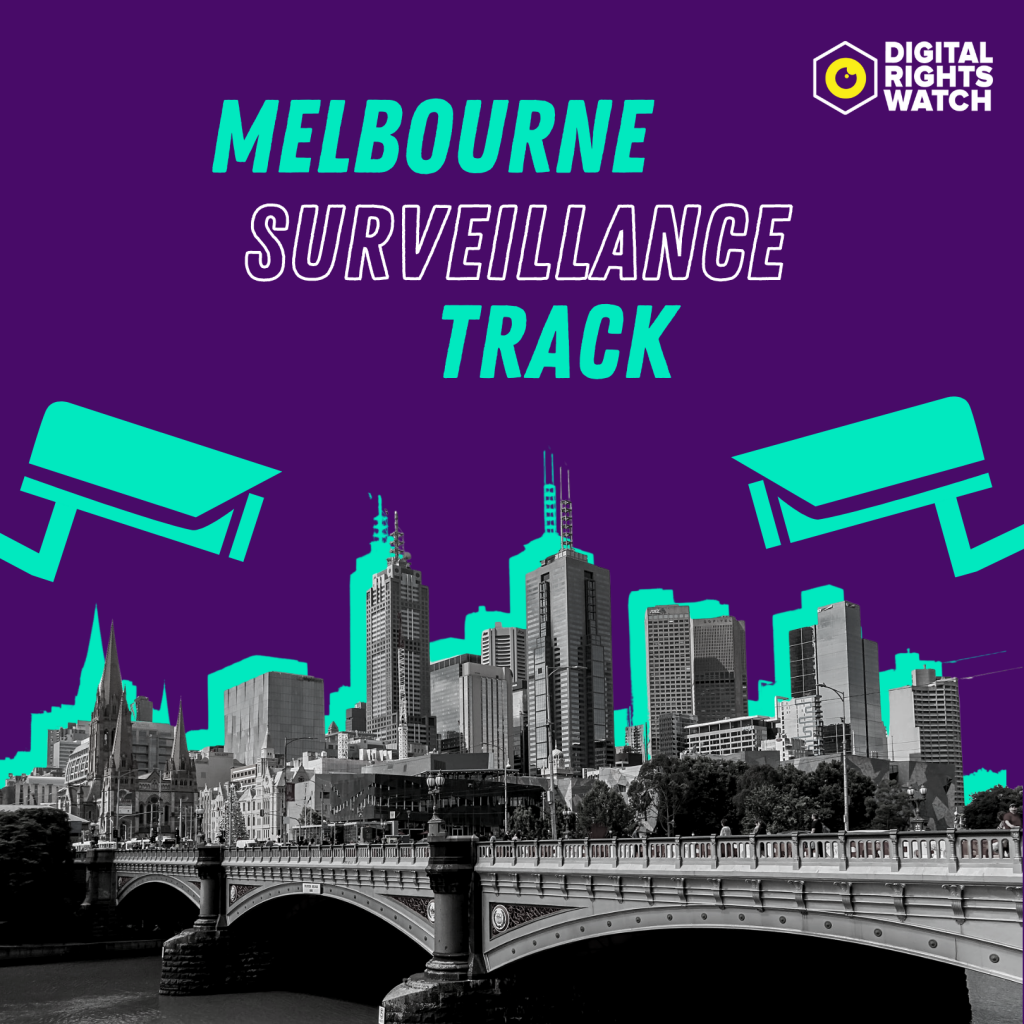As the year crawls forward, we’re busy working across a number of different fronts to advance digital rights in Australia. This month we’re looking back at government inquiries, new legislation, and announcing the Melbourne Surveillance Track!

Tracking surveillance in public spaces

We are thrilled to be involved in this year’s Melbourne Knowledge Week, hosted by the City of Melbourne. To help us all learn about surveillance in public spaces, we developed a guided walking tour through the streets of Melbourne’s CBD.
Head to this page on our website to learn more about the project, and how it relates to our work pushing for local governments around Australia to ensure they embed human rights into their smart city initiatives. If you missed a spot in one of our in-person tours this weekend, never fear! We have created a mobile-friendly website with a map and accompanying audio. Fancy going tech-free? You can also print out all the information here, and leave your phone at home!
The anonymity debate
Every now and then, someone in power who has never had any concern about how they might be persecuted or discriminated against for their own identity suggests: why don’t we just force everyone to use their real names online?
The question of anonymity has reared its head once more in Australian debate as a Parliamentary Committee published a report on its inquiry into family violence which included a recommendation for social media platforms to verify users with 100 points of identification in order to stop online abuse. Mitigating online abuse is, of course, an important goal. Yet, there is actually very little evidence to support that ‘real names policies’ will in fact reduce online abuse. Rather, there is plenty of reason to believe that maintaining online anonymity is *essential* for the free and open internet to function, and can actually ensure and improve safety for many vulnerable groups.
Have we piqued your interest? Read more about why anonymity online is really important in this blog post by our Director Lucie Krahulcova.
An update on the Data Availability and Transparency Bill
You may remember that in the second half of 2020 we made a submission on the Data Availability and Transparency (DAT) Bill. Long story (and many, many documents) short, the DAT Bill stands to fundamentally alter the way that public sector data, including our personal information, is shared both within government, as well as from government to the private sector. On 20th April, our Director Lucie Krahulcova, appeared at a Parliamentary hearing into the bill to testify to the ways this bill presents challenges to our rights, especially privacy. There are many issues with the bill, but here’s the highlight reel:
- It will undermine Australian Privacy Principle 6, which puts limitations in place to prevent organisations which are regulated by the Privacy Act from taking the personal information they collect for one purpose, and using it for a completely different purpose (the ‘secondary purpose’ in privacy law lingo).
- It is happening at the same time as the review of The Privacy Act. It does not make policy or financial sense to pass legislation about data sharing, which would be exempt from the resulting rules and standards that will (hopefully) be established by the Privacy Act review.
- It contains vague references to the ‘public interest’ with no requirement for specific testing to ensure that privacy and autonomy are weighed against other interests i.e. the commercial ones. (As an aside, read our blog post on the need to move away from thinking about Privacy as a bargaining chip in the economy).
- The scheme relies on obtaining consent, unless doing so would be “unreasonable or impracticable,” to which we ask: when exactly will it be “practicable” for government agencies to seek meaningful consent from millions of Australians?
The government is asking us to trust them in good faith to share our personal information with very few safeguards in place, or remedies available when things go wrong. And as we have all seen, things do go wrong. There are, sadly, far too many examples where the Australian government has released, leaked, shared or otherwise used our personal information where the privacy of individuals was not sufficiently protected.
You can read about the Bill and the hearing in The New Daily, or in InnovationAus. On Thursday 29 April the committee tabled their report, which contains a recommendation to consider (some) of the privacy and security concerns raised by us and other participants in the inquiry. The Labor Party has also denounced the “deeply flawed” bill altogether. We will be watching closely to see what happens next.

What Digital Rights Watch has been up to over the past month…
- If you’ve missed any of the fortnightly Tech Talks, you can always watch them back. We particularly loved this session with Lizzie, Peter and Belinda Barnet from Swinburne University on ID checks for social media, defamation and disinformation, and Amazon’s union shakedown. Watch it back here.
- As we continue to be let down by major social media platforms, the conversation around how we might create better digital public spaces is gaining momentum. Lizzie joined Peter Lewis and Eli Pariser to discuss this in detail, and to launch a new report from the Centre for Responsible Technology: The Public Square Project. While we at DRW do not always share the same opinions with the Centre for Responsible Technology (if you’ve seen literally any of the Tech Talks, this comes as no surprise), the thing we absolutely do have in common is a commitment to thinking big about how we can create the kinds of future where technology is used in ways that are fair, sustainable, and uplifting.
- Lizzie joined the Earth Matters team at community radio station, 3CR, to discuss the Online Safety Bill, and how it is a threat to activism. Listen back here.
- Our Program Lead, Sam Floreani, had a chat with 4zzz Radio on some of the challenges of facial recognition technology, and why it still isn’t a good idea to broadly adopt it even if the technology “works.”

Don’t miss out—mark these upcoming events in your calendar!
- Privacy Awareness Week (3-7 May) is next week. We’ll be at this May 4th OVIC panel (11am AEST), titled Prioritising Privacy in a Digital World, and featuring Lizzie.
- May 4th is a busy day for Lizzie, as that evening at 5pm AEST she will be joining the Australian Society for Computers and Law for a discussion on how to build technology as a tool for social good. Register here.
- If you’re an early riser, you can catch Edward Snowden in discussion with EFF on May 6 at 5am AEST. Don’t worry if not, it will be available on their YouTube Channel afterwards.
- Have you been watching the fortnightly Tech Talks? They are a great way to keep up to date on all things tech. The next one is on Friday 7 May, and you can register here.
- On May 8th is the International Festival of Whistleblowing, Dissent and Accountability. The festival includes art, music, film & theatre as well as practical workshops, panels, interviews and mini-lectures. Learn more and participate here.
- Join Cyber Collective on May 28, 8am AEST for a seminar on the effects of surveillance on Immigration.
- Have you grabbed a ticket to RightsCon? It’s on 7-11 June and will be entirely virtual. Digital Rights Watch is hosting a panel discussion exploring how we can rebalance the internet economy.

You may have seen the recent announcement that Apple has rolled out an important privacy feature in its latest software update: the option for people to opt-out of tracking by other apps (including Facebook), when using an iPhone or iPad.
Prior to this change, advertisers were able to track users’ activity across various apps on iPhones. According to Apple, the average app includes six third-party trackers which are there solely to collect and share your data. It’s a *no thank you* from us.
If you are an iPhone user and haven’t done it yet, here’s an easy guide from Mozilla to putting these Apple updates to use, to prevent cross-app tracking on your phone. It may not solve everything, but this is a big step in the consumer privacy space, especially considering many people may not have even been aware until now just how much they were being tracked on their phone.
We’re sure we don’t need to convince you to do this, but it is a great opportunity to have a chat with your friends and family about privacy, surveillance and the update, so they know they can opt out. We like to think of every person that opts out as giving surveillance capitalism the [virtual] finger.
See you in May!
